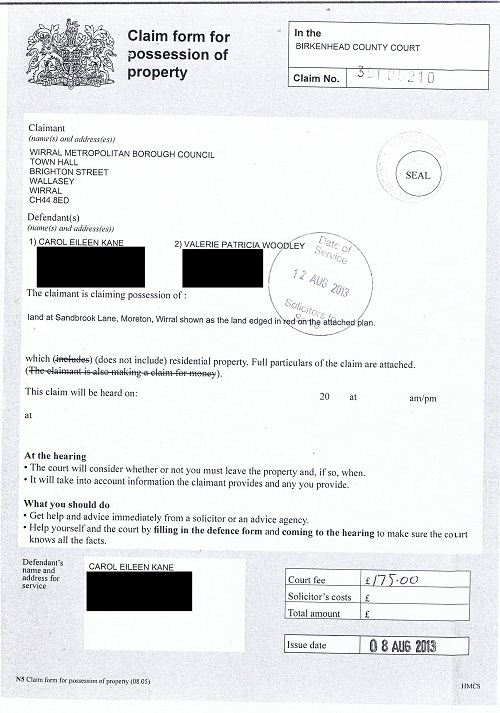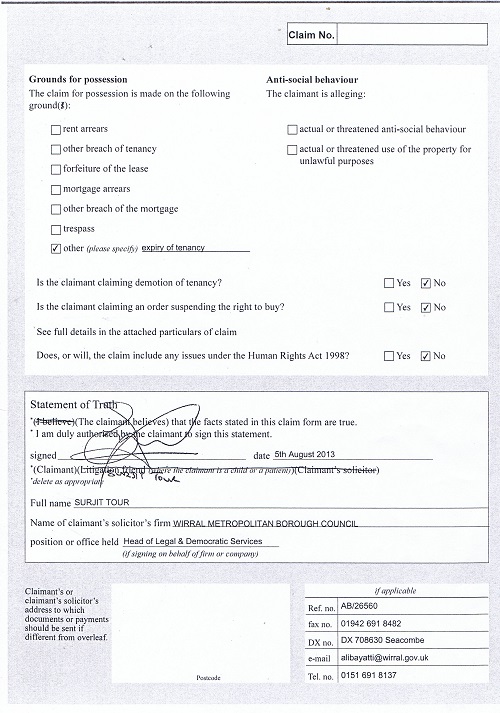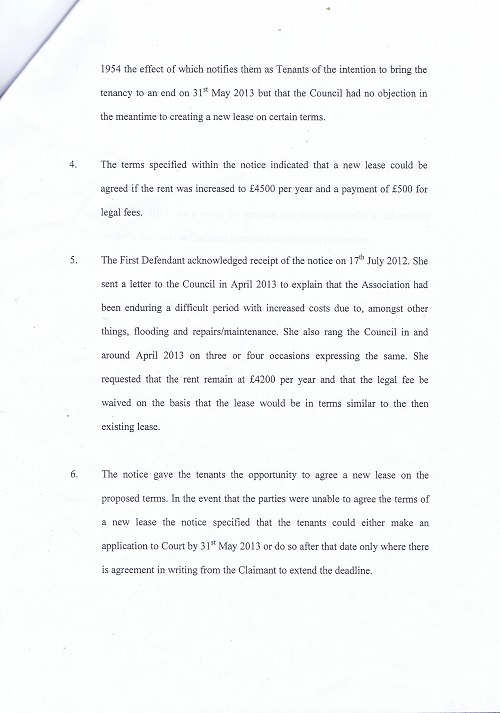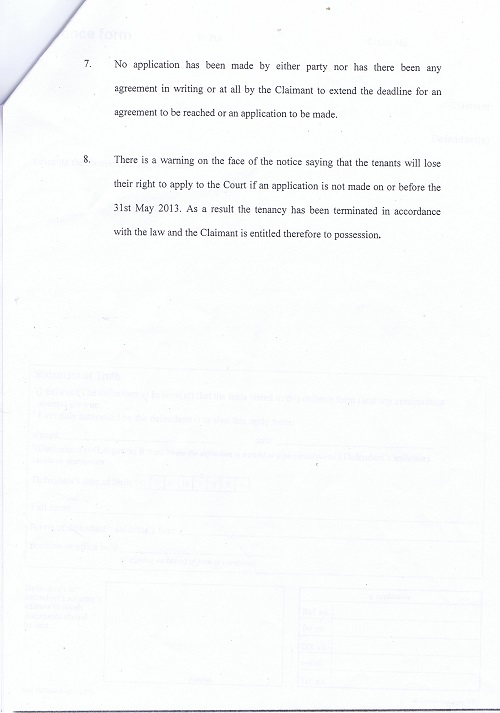EXCLUSIVE: How Wirral Council’s court case to evict the Fernbank Farm tenants began on the 8th August 2013
Contents
- Part 1 Why am I redacting parts of court documents before publishing them?
- Part 2 N5 Claim Form for possession of property – How Wirral Council started its claim for a possession order for Fernbank Farm
- Part 3 Particulars of Claim
- Part 4 The map attached to the Particulars of Claim
Why am I redacting parts of court documents before publishing them?
Before I start with a blog post about how Wirral Council’s claim for a possession order for the land known as Fernbank Farm in Sandbrook Lane I am going to explain why I have redacted certain details from these documents before publishing them as well as the arguments for and against disclosing them without redactions. The general principles behind this I wrote about yesterday in Getting information about Fernbank Farm is made unusually difficult; what are they trying to hide?.
Attached to the particulars of claim is a map showing the land this case is about edged in red (although on the black and white photocopy I have it’s edged in black). Unfortunately the map is crown copyright and although Wirral Council have a licence to publish it I don’t, therefore the map and compass are blacked out from that document. I will however provide a description of where the land is and a link to a map. The title on the map lists it as being at Sandbrook Lane, Upton. Most people would regard it as being in Moreton, not Upton as it’s North of the M53 Junction 2 spur and the particulars of claim refer to it as being in Moreton.
To the documents that started the claim (the N5 form, particulars of claim and map) I have made two other redactions. The claim form itself has the home addresses of both defendants. However the request for a possession order does not relate to either of their home addresses, but to Fernbank Farm in Sandbrook Lane. During the fast track trial in February 2014 both defendants gave evidence from the witness stand and stated their home address in open court (at a public hearing) in front of about fifty people.
Personally I have no problem with my home address being in the public domain, as when you stand in an election it becomes public knowledge. My attitudes on privacy are therefore probably different to most of the population! Neither of the defendants are “public figures” and in my view therefore are entitled to a certain degree of privacy with such information. The case has nothing to do with their home addresses as it is to do purely with them being signatories to a lease with Wirral Council for Fernbank Farm.
Arguments in favour of disclosure of the defendant’s home addresses would be that these details have been given in open court and it would allow those reading this to contact them directly. However both have Facebook profiles, which can be used if people wish to contact them directly. If either Mrs Kane or Mrs Woodley are reading this and are happy with their home address/es being published my contact details are here.
Search engines cannot properly index or read scanned images, therefore the text of what is in these documents is included below it. As usual with images I post on this blog, a thumbnail is used and you can click on the thumbnail for a higher resolution image.
N5 Claim Form for possession of property – How Wirral Council started its claim for a possession order for Fernbank Farm
This is a link to the current (2014) blank version of the N5 claim form (for possession of property) which has minor changes to the 2013 version used by Wirral Council in their claim.
Claim Form for possession of property
| In the BIRKENHEAD COUNTY COURT |
|
| Claim No. | 3BI05210 |
Claimant
(name(s) and address(es))
WIRRAL METROPOLITAN BOROUGH COUNCIL
TOWN HALL
BRIGHTON STREET
WALLASEY
WIRRAL
CH44 8ED
Defendant(s)
(name(s) and address(es))
1) CAROL EILEEN KANE 2) VALERIE PATRICIA WOODLEY
(address redacted) (address redacted)
The claimant is claiming possession of:
land at Sandbrook Lane, Moreton, Wirral shown as the land edged in red on the attached plan.
which (includes) (does not include) residential property. Full particulars of the claim are attached.
(The Claimant is also making a claim for money).
This claim will be heard on: 20 at am/pm at
At the hearing
- The Court will consider whether or not you must leave the property and, if so, when.
- It will take into account information the Claimant provides and any you provide.
What you should do
- Get help and advice immediately from a solicitor or an advice agency.
- Help yourself and the court by filling in the defence form and coming to the hearing to make sure the court knows all the facts.
Defendant’s name and address for service
CAROL EILEEN KANE
(address redacted)Court fee £175.00 Solicitor’s costs £ Total amount £ Issue date 08 AUG 2013 N5 Claim form for possession of property (08.05) HCMS
Document has the Birkenhead County Court seal and is also stamped Date of Service 12 AUG 2013 Solicitors to ServeClaim No. Grounds for possession
The claim for possession is made on the following ground (s):rent arrears
other breach of tenancy
forfeiture of the lease
mortgage arrears
other breach of the mortgage
tresspass
(tick) other (please specify) expiry of tenancyAnti-social behaviour
The claimant is alleging
actual or threatened anti-social behaviour
actual or threatened use of the property for unlawful purposesIs the claimant claiming demotion of tenancy? Yes (tick next to No) No
Is the claimant claiming an order suspending the right to buy? Yes (tick next to No) No
See full details in the attached particulars of claim.
Does, or will, the claim raise any issues under the Human Rights Act 1998? Yes (tick next to No) NoStatement of Truth
*(I believe)(The Claimant believes) that the facts stated in this claim form are true.
* I am duly authorised by the claimant to sign this statement.signed (Surjit Tour’s signature) date 5th August 2013
*(Claimant)(Litigation friend (where the claimant is a child or a patient)(Claimant’s solicitor)
*delete as appropriate
Full name SURJIT TOUR
Name of claimant’s solicitor’s firm WIRRAL METROPOLITAN BOROUGH COUNCIL
position or office held Head of Legal & Democratic Services
(if signing on behalf of firm or company)Claimant’s or claimant’s solicitor’s address to which documents or payments should be sent if different from overleaf. Postcode
if applicable
Ref no. AB/26560 fax no. 01942 691 8482 DX no. DX 708630 Seacombe e-mail alibayatti@wirral.gov.uk Tel. no. 0151 691 8137 Particulars of Claim
IN THE BIRKENHEAD COUNTY COURT Claim No.
BETWEEN:-WIRRAL METROPOLITAN BOROUGH COUNCIL
Claimant
-and-
CAROL EILEEN KANE (1)
First Defendant
-and-
VALERIE PATRICIA WOODLEY (2)
Second Defendant
=======================================================================================================
PARTICULARS OF CLAIM
=======================================================================================================
1. The Claimant is the owner of approximately 10.12 acres of land situated at and described as land at Sandbroook Lane, Moreton, Wirral, Merseyside and shown edged in red on the plan attached.
2. On 29 July 2008 the Claimant entered into a lease of the land with the First and Second Defendants who are trustees of the Upton Park Pony Owner’s Association. Upon expiry of the fixed term the lease converted into a monthly periodic tenancy in July 2011. The expressed rent payable for the lease was £4200 per year payable in equal monthly instalments.
3. On 13th July 2012 the First and Second Defendants were served with a notice in the prescribed form persuant to section 25 of the Landlord and Tenant Act
1954 the effect of which notifies them as Tenants of the intention to bring the tenancy to an end on 31st May 2013 but that the Council had no objection in the meantime to creating a new lease on certain terms.
4. The terms specified within the notice indicated that a new lease could be agreed if the rent was increased to £4500 per year and a payment of £500 for legal fees.
5. The First Defendant acknowledged receipt of the notice on 17th July 2012. She sent a letter to the Council in April 2013 to explain that the Association had been enduring a difficult period with increased costs due to, amongst other things, flooding and repairs/maintenance. She also rang the Council in and around April 2013 on three or four occasions expressing the same. She requested that the rent remain at £4200 per year and that the legal fee be waved on the basis that the lease would be in terms similar to the then existing lease.
6. The notice gave the tenants an opportunity to agree a new lease on the proposed terms. In the event that the parties were unable to agree the terms of a new lease the notice specified that the tenants could either make an application to Court by 31st May 2013 or do so after that date only where there is agreement in writing from the Claimant to extend the deadline.
7. No application has been made by either party nor has there been an agreement in writing or at all by the Claimant to extend the deadline for an agreement to be reached or an application to be made.
8. There is a warning on the face of the notice saying that tenants will lose their right to apply to the Court if an application is not made on or before the 31st May 2013. As a result the tenancy has been terminated in accordance with the law and the Claimant is therefore entitled to possession.
The map attached to the Particulars of Claim
title
Land at
Sandbrook Lane
Uptonscale 1:2500
date 8/7/2013
map ref. 39SE© Crown Copyright. All Rights Reserved. Published 2010. Licence number 100019803.
Tel: 0151 666 3884 Fax: 0151 606 2090
Asset Management Section, Universal and Infrastructure Services, Cheshire Lines Building, Canning Street, Birkenhead, CH41 1NDThe map is Crown Copyright but if you follow this link the land in question is the land North of Fernbank Lane (which is found next to the M53 Junction 2 spur), West of Manor Drive, South of the houses on Croft Drive and East of the houses in Ravenstone Close and The Park House.
Continues at EXCLUSIVE: What was the defence used in Wirral Council’s court case to evict the Fernbank Farm tenants?.
If you click on any of the buttons below, you’ll be doing me a favour by sharing this article with other people.





